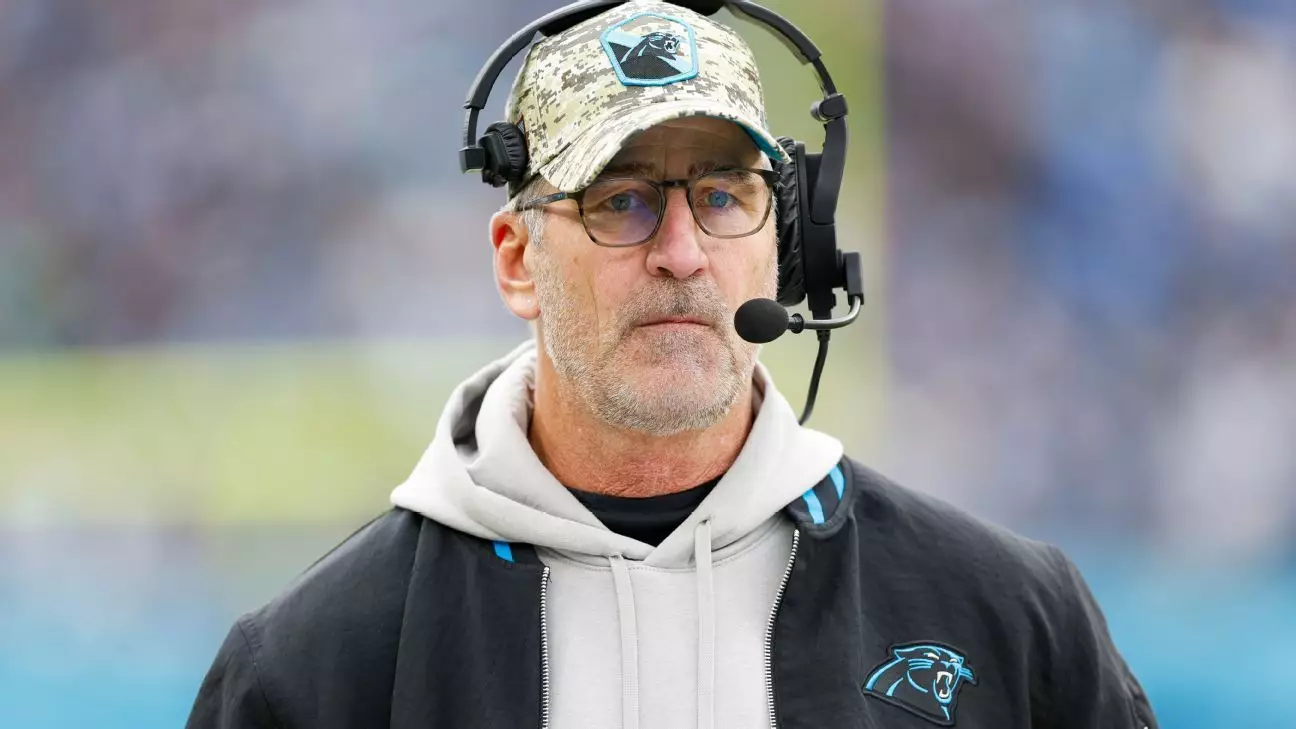In an unexpected shake-up, Stanford University announced the appointment of Frank Reich as the interim head coach for its beleaguered football team for the upcoming 2025 season. This decision comes on the heels of a tumultuous period marked by the firing of previous coach Troy Taylor, who faced allegations of bullying and misconduct that left the football program in disarray. It’s a moment ripe for analysis, not only because it signifies a potential turnaround but also highlights the deeper issues plaguing college athletics today.
Stanford football, once a paragon of excellence, has withered over the past few seasons, achieving a dismal 3-9 record for four consecutive years. Reich, a veteran coach with a questionable recent past—including a stormy tenure with the Carolina Panthers—now finds himself at the helm, tasked with revitalizing a program that hasn’t experienced a winning season since 2020. While Reich’s prior experience with significant backstories in the NFL provides some hope, it begs the question: Are we merely bandaging a sinking ship, or is this a genuine attempt to recalibrate the course of Stanford football?
A Troubling Legacy of Aggression
The backdrop of this coaching change is rather disturbing. Troy Taylor’s dismissal was not a casual exit; it represented systemic issues that have festered beneath the surface. Reports of bullying and inappropriate comments within the coaching staff scream of a toxic environment that not only undermines player morale but also raises questions about the administration’s oversight. Universities like Stanford, which pride themselves on integrity and excellence, must grapple with the implications of hiring practices that overlook character. The spotlight now shines on the entire athletic department, necessitating a broader commitment to fostering inclusive and respectful environments.
Given the revelations about Taylor, Reich must tread carefully. He inherits a team beleaguered with controversy, and the burden is heavy: reshape the program while restoring faith among players, recruits, and alumni—no easy feat. An interim label often comes with minimal long-term commitment, but for Stanford and Reich, this hire needs to transcend the transient. The task ahead requires more than just strategizing on the field; it demands a cultural makeover.
Leadership Redefined: A Different Kind of Coach
Reich’s leadership style as a coach has been characterized by profound connections with players. His experience with different quarterbacks, including managing high-stake scenarios with Carson Wentz and Philip Rivers, showcases his ability to nurture talent. However, turning that into a coaching philosophy that resonates with Stanford’s academically driven athletes remains uncertain. Will he pivot from an NFL mindset to cater to student-athletes who prioritize their education alongside their passion for football?
The promotion of tight ends coach Nate Byham to offensive coordinator is an intriguing move that suggests a willingness to innovate right away. Byham will call the plays, and although his own experience is relatively limited, this partnership with Reich could potentially be the spark that ignites the troubled Cardinal. The road ahead will dictate whether Reich can seamlessly blend the angst of the past with a fresh vision, aiming to maximize not just performance but also the holistic growth of each player.
The Underbelly of NCAA Football
Critically, Stanford’s transition isn’t happening in a vacuum. The specter of NCAA oversight looms large, with compliance issues that previously landed Taylor in hot water. The firing of a coach because of compliance violations calls into question broader administrative culpability. The system needs reform that prioritizes ethical standards over mere athletic success.
Furthermore, the impending transfer of top player David Bailey raises alarms about the program’s stability and future. If star players are departing, it may signal a larger exodus, undermining Reich’s attempts to build trust. The shift from a culture of bullying to one of nurturing is essential, but also incredibly challenging, especially under a one-season deal. The focus must be on transparency and sustainable growth, if Stanford is to reclaim its competitive edge.
In summation, while Frank Reich’s selection as interim coach could represent a glimmer of hope for Stanford football, the realities pose significant challenges. It will take an unwavering commitment to transformative leadership and culture building to reshape a program caught in the crosshairs of adversity. The stakes have never been higher, as the legacy of Stanford football hangs precariously in the balance.


Leave a Reply